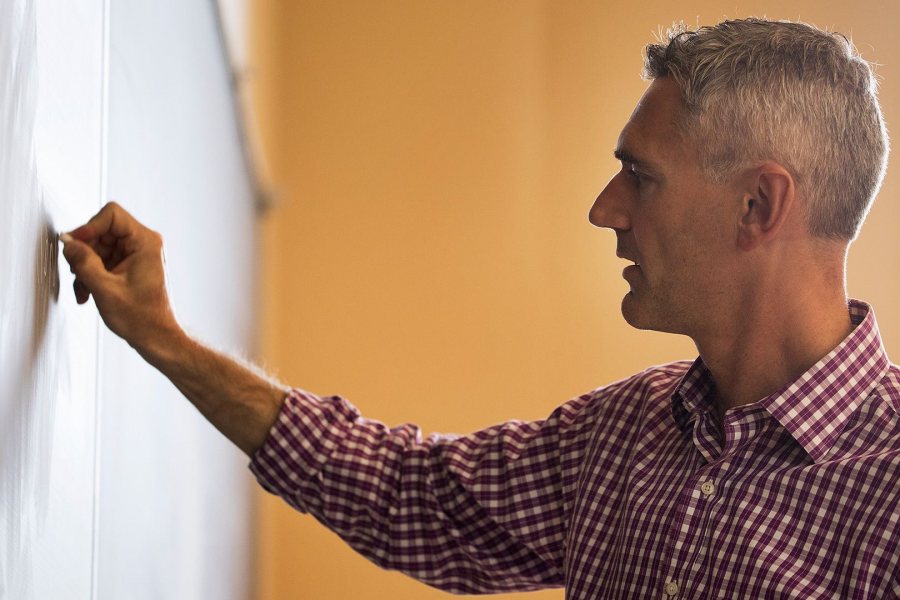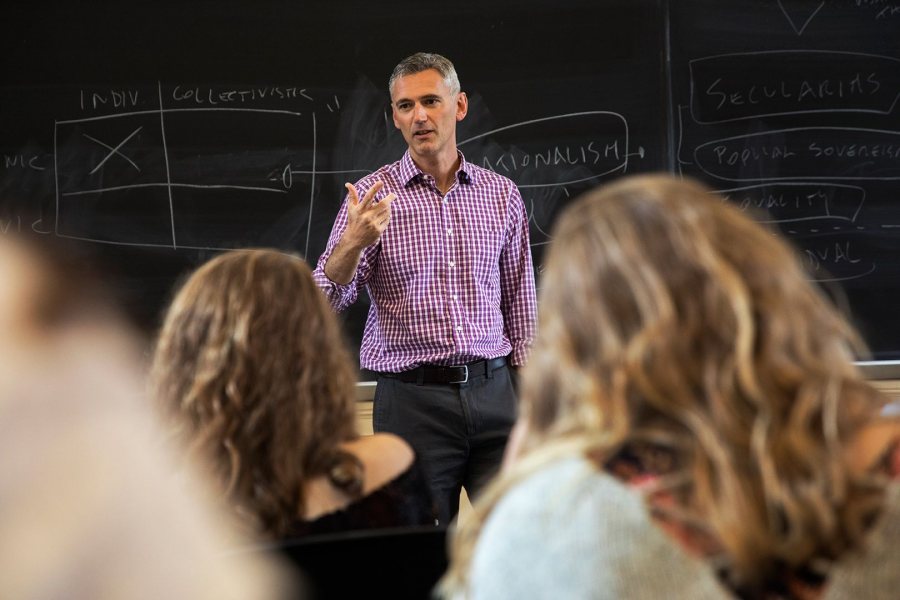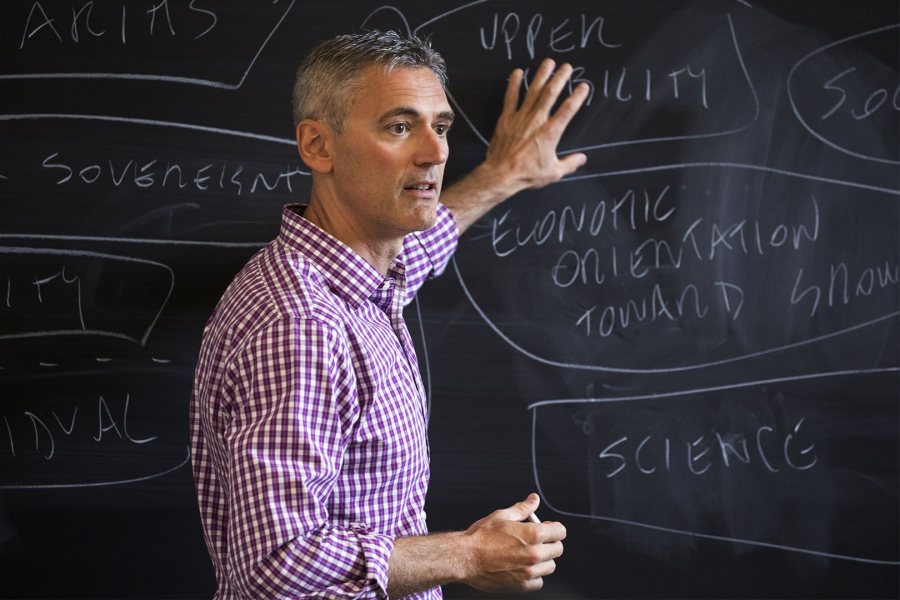
The bottom line for impoverished Americans is, of course, that they have less money than their fellow citizens.
Which leads to other things they likely have less of: nutritious food, personal safety, health benefits, vacation time, career opportunities, child care, retirement funds, peace of mind. And the list goes on.
Still, there’s one thing the poorest Americans do possess a lot of: patriotism. It’s a fact: By many measures, the Americans who have the least nevertheless love their country the most, despite ample cause for feeling the opposite.
Paradoxical, no? It struck Professor of Sociology Francesco Duina that way, too. But, as he learned in researching his latest book, it isn’t really a paradox after all.
From his research, Francesco Duina offers three possible reasons why the poorest Americans love their country the most.
New from Stanford University Press, Broke and Patriotic: Why Poor Americans Love Their Country lets economically disadvantaged people explain their devotion to the United States. It’s a collection of views that may move readers to think again about America’s poorest citizens — whose patriotism, as Duina suggests, fueled the White House aspirations of both Donald Trump and Bernie Sanders.
+An excerpt from Broke and Patriotic
Many of the people I met had no stable jobs, and a good number did not have permanent housing. Often, they recounted that at some point in their lives things went terribly wrong — with substance addiction, for instance, or an abusive partner or parent — and ever since they had found themselves unable to hold on to a steady job or provide properly for themselves and their children. Some were convicted felons, just released from prison and looking to make a fresh start with a few dollars in their pockets.
To be sure, a good number did work, received government benefits (often for disability), or enjoyed some kind of retirement benefits. But even in these cases their income was so limited that they often found it impossible to make ends meet.
As Michelle, a middle-aged black woman in Birmingham told me, a relatively senior job as manager at a McDonald’s restaurant means a paycheck of only eight hundred to nine hundred dollars a month, while working in construction in Billings translates, at least for Kevin, a young white man, into ten thousand dollars a year. Even without children or other dependents, these are inadequate amounts for a decent living.
These Americans struggle. But in their minds and hearts there is little doubt that their country is exceptional. They feel that there is something transcendental about America. It has a special place in the history of the world. They view the United States, despite its shortcomings, as still the shining city on a hill: a place designed and intended to represent deliverance from the ills that have plagued humanity throughout history to this very day.
America, in a word, represents hope, both for humanity and for each individual person in the country, including, crucially, themselves.
This belief in the exceptionality of the United States became all the more stark when the interviewees spoke of other countries. Pictures of oppressive and destitute places were frequently evoked. While other countries deprive their citizens of all kinds of basic necessities, America — with its principles and immense practical generosity — offers reprieve and the possibility of a better future.
For someone struggling every day to make ends meet, such promises are particularly valuable. The idea of exceptionality was further reinforced by a belief that, while God is kind and loves everyone equally, he holds America in a special place in its heart: America is God’s country.
And with this there was also an almost tragic sense, described by several, that one has to believe in America: when all else seems to be a struggle, faith in country, and in America in particular, is a must. — from Chapter Four, “The Last Hope”
Visiting four municipalities in Alabama and Montana, Duina interviewed more than 60 subjects who had poverty in common but were otherwise quite diverse. The book is his third study of American culture, after Winning: Reflections on an American Obsession, from 2011, and 2014’s Life Transitions in America.
Duina notes that while social scientists have studied the patriotism of many groups, this is the first research to look specifically at the patriotism of low-income Americans.
What led you to write Broke and Patriotic?
I could understand why those Americans who were well-off would be patriotic. But I wanted to understand why low-income Americans are so patriotic when there are reasons to think that they would have issues with their country or its underlying social contract, considering their personal circumstances.
As you point out, worse-off folks in places like Sweden and France typically enjoy greater public benefits than America’s poor. And yet poor Americans are more patriotic than their counterparts in other wealthy countries.
What I thought to be a puzzle is, for them, not a puzzle at all. First, they don’t attribute their situation to their country — they don’t say, “I’m in this situation because of the society I live in.” They take ownership of their life histories. And so why would they be resentful toward their country?
Also — and this is one of the most moving things that I discovered — if anything, the idea of the greatness of America actually gives them something to hang onto, despite everything. “Everything else has gone poorly for me. Don’t take my being an American away from me, because it’s the one thing that I can still hang onto with pride.”
I would push them by saying, “Well, what about rich people? Do you think it’s unfair that they have what they have?” They’d say, “No, they’ve earned everything they’ve made.”

Francesco Duina leads his political sociology class in Hedge Hall in September. (Theophil Syslo/Bates College)
You describe three common elements, broadly speaking, within your respondents’ love of country. They feel that America represents an exceptional promise of hope, and also that the U.S. is both wealthy and generous — the land of milk and honey. But what hit home for me was how they explained America’s greatness in terms of American freedoms.
One of the interviewees that really struck me was Marshall, in Montana, who chose to be homeless, in a way. He said, “Look, I am so free. I can be homeless, and they don’t force me to go anywhere. I live on the prairie, I’m working on an app right now, and I’m taking a sabbatical from life. What other country would allow me to just do my thing?”
That is really a trait of American society in many ways: “We’re all equal and therefore this equality guarantees me some sense of freedom. I may have nothing, but I have that freedom. I can come and go, do whatever I want, and say whatever I want. This country guarantees that.” And the fact that they would recognize and hold onto that was really moving. What I heard satisfied my curiosity.
Culturally, the United States is very free — freedom of religion, freedom of thought, freedom of saying and doing whatever you want to do. And they’re accurately describing that. There’s certainly more conformity in many countries, a lot more pressure to do things in certain ways.

Many of Duina’s interviewees felt that that social equality helps to guarantee their freedom. (Theophil Syslo/Bates College)
A respondent that you call Eddie said the U.S. is “the last best hope of man on earth.” That’s quite a sentiment.
Great guy, very talented. Many of the people I spoke with perceive the country to be a special project designed to give deliverance, to free humanity from problems that have plagued people throughout history. The hope that the U.S. represents for humanity is what gives them hope and dignity as well, and what makes them continue, despite the odds.
Many of them were very optimistic as a result. Something I heard a lot was, “Tomorrow something is going to change. I’m poised for a change.”
Follow Francesco Duina’s posts on American poverty and patriotism on the Massachusetts Foundation for the Humanities website.
And then there’s the American Dream, the U.S. as the land of milk and honey.
Yeah, despite all of the data that suggests that, in fact, there’s less social mobility nowadays in the United States than in many other advanced countries, and your personal financial success is tied to contextual and structural things, not personal qualities — there’s clearly a sense that this is a place of enormous wealth, and that the American Dream is still alive.
I would say, “But you know, you don’t get as much as other people in other countries.” And they would say, “Well, I don’t know what other people get, but I get a lot. I’m not going to go hungry tonight. There will be kitchens and shelters that I can go to and churches that will help me. So the wealth will reach me. And if I have a problem, it’s my problem, not the system’s problem.”
How is this book relevant to our current politics?

Most of the financially disadvantaged people that Francesco Duina interviewed for Broke and Patriotic, he says, “take ownership of their life histories.” They don’t blame the system. (Theophil Syslo/Bates College)
I think this discourse of American greatness is something that Trump tapped into very, very much. To the extent that one wonders why “Make America great again” resonated so well, you have elements of the answer in this book, whether with low-income people or middle-class people. I would think that Bernie Sanders also tapped into it a bit, but in a very different way.
Who is the book written for?
People who are interested in understanding the United States, how it functions, what keeps it together — what is at the heart of its social contract, its national identity. My respondents have a genuine attachment to the idea of America, and I think that’s because, in the end, what one discovers is that America is for the people and the people own it.
We should all try and understand their patriotism. Much depends on it. They contribute heavily to the military — their investment in the country, in a way, contributes to stability and social peace. As long as they believe in the American Dream and in the United States as a country they are unlikely to demand fundamental changes of society. And so, if we want to understand why the United States is a stable country, we have to understand why people latch on so tightly to it, even though they appear to be suffering and getting a lot less than the poor elsewhere.




